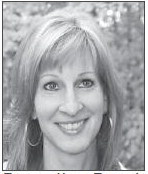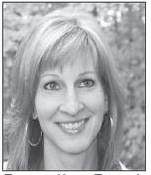The Unfathomable Tale From Fannin County


It sat on my desk for several weeks whispering to me to open it and start reading, but my life was filled with more pressing distractions.
“I want to read that newest book — the one by the writer from Baxley you kind of know,” my mother said on a phone call at the beginning of December.
I looked at the book on my desk and scanned the spine with my eyes.
“‘The Woods of Fannin County’ by Janisse Ray?” I asked.
“Yeah, that one,” Mom replied. That night, I cloaked my copy in shiny wrapping paper and tied it securely with red curling ribbon. I put my mother’s name on the tag and placed it under our Christmas tree.
Mom opened it on Christmas morning and held the paperback in front of her.
“I haven’t had a chance to read it yet, Mom, so you read it first,” I said.
Mom read it the following week — devouring each word and commenting on the story during our evening phone calls.
“It’s unbelievable what that woman — what that entire community — did to those children,” she said. “It’s hard to imagine that such evil exists in the world, but I know it does. Bad things happen every day.”
The following week, my mother lent it to my sister. Once Audrey cracked it open, she, too, couldn’t put it down.
“I know you’ve been busy, but have you read it yet?” my sister asked me.
“No, but I know a little bit about the story,” I said.
I finally read my copy this past week. Then I listened to it on my work commutes via the magic of Audible. The author, Janisse Ray, of Baxley, read the book herself in the audiobook version.
Her story is a work of fiction based on a true story told to her by survivors — adult brothers and sisters who were carried by mule and wagon to a shack on a remote and rugged mountain near Morganton, Georgia, in 1945 and dumped out like garbage. There were eight of them — like stair steps. The oldest child, Bobby, was 10 and the youngest, Norma Jean, was just a few months old, when their mother, Ruby Woods, and grandfather, Mr. Allen, left them on that mountain without supervision, care or love.
The mother gave the oldest girl a 5-minute lesson on how to make hominy with creek water and ashes before leaving a small bag of corn in the shanty and walking away.
Those children lived without parental guidance and protection for four years — roaming the wilderness, foraging for food, scavenging for supplies, begging for help, stealing from gardens, orchards and smokehouses, freezing to death, crying, starving, suffering, and knowing they had been abandoned. All the while, people in the community knew they were up there alone and did nothing.
“Now when we go back and look, we’re pretty convinced that we were put there to die on a mountain in Fannin County, Georgia,” narrator, Bobby, says in Ray’s account. “That’s about the only conclusion a person can reach. It doesn’t register that a family, even a whole community, could do that to eight children they didn’t want. But they did.”
At another point Bobby notes, “Where we lived up on that mountain was called Loving. I wish someone could explain that. It was a name that sure as hell didn’t fit.”
After four years, six of the children continued from page
were shuttled off to Hapeville to the Georgia Baptist Children’s Home before eventually moving to the Baxley campus. Bobby, at fourteen, was deemed too old to be rescued by the orphanage. All eight grew up and led full, productive lives.
As the story unfolds, readers realize that Ray’s book is a story of survival, resilience and the unbreakable bonds between eight siblings who grew up taking care of one another. She gave these survivors a voice, and their story is finally being heard and contemplated.
They say that the atrocities of the real world are far worse than anything one can imagine, and I believe this is true. These accounts are harsh reminders of the extremes of the human experience. Though difficult to digest, we need to hear these stories and consider them so that we don’t make the same mistakes made by those who came before us. May we never turn away from the fragile souls who need us most. Ray’s book hits that point home.






out of
Posted on